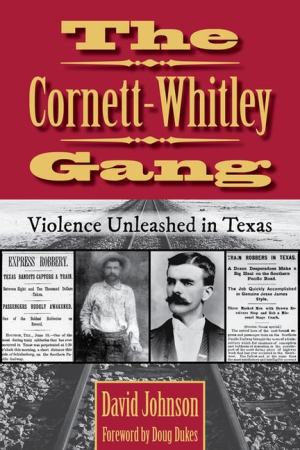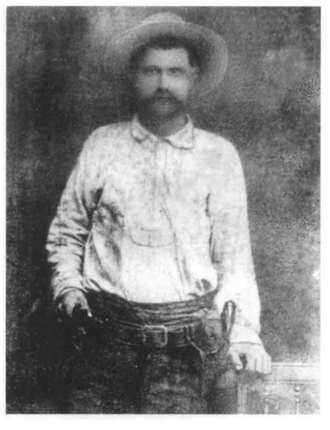
A new book is due to be published in the next couple of months, and its subject is of keen interest to my wife and her siblings.
You see, it’s about her third cousin three times removed — Braxton E. “Brack” Cornett, gunslinger, bank-and-train robber, and … family.
The Cornett-Whitley Gang: Violence Unleashed in Texas
By David Johnson
Product details:
320 pp. w/19 b&w illustrations
Book size: 6 x 9 inches
ISBN-13: 978-1574417685
University of North Texas Press
Publish date 13 June 2019 (according to publisher)
Publish date 15 July 2019 (according to Amazon.com)
Brack Cornett: Fact and Fiction
I have not seen a copy of David Johnson’s new book on Brack Cornett and his short-lived outlaw life. But I have read enough of the history of Cornett from other writers and even press accounts from the time to know that the stories and legends vary widely.
For example, there are many historical “guesses” for various aspects of Cornett’s life: the state in which he was born, the year in which he was born and the state in which he was shot and killed.

Brack Cornett
Laban named his son after his own brother, Braxton Cornett, and sometime in the following two decades, Laban and his family (which by then included a daughter, Cordelia, named after her mother) moved to Texas. This was where the twenty-something Brack would become a legendary outlaw.
And there are at least two theories as to where he died, Frio, Arizona, or Frio, Texas. Almost certainly, he was killed in a shoot-out in Frio County Texas.
It will be a great service to history if Johnson’s new book is able to straighten out the myth and contradictions, and leave us the true story.
I’ve included below a few additional items about Brack and the new book. First, the publicity book summary provided by the publisher, the University of North Texas Press. After that are four pre-publication reviews, followed at the bottom by a newspaper article about the death of Brack Cornett published in The Austin Weekly Statesman February 16, 1888. It has some of the most flowery, over-the-top, highfalutin, “old West” writing you’ve ever run across —
He is dead; no door nail was ever deader.
Finally — and don’t miss this, folks! — your own personal chance to listen to “The Ballad of Brack Cornett,” sung by Jesse and the Hogg Brothers. (That’s all right. I don’t know them from Adam, either!)
Book summary (from publisher)
During the late 1880s, the Cornett-Whitley gang rose on the Texas scene with a daring train robbery at McNeil Station, only miles from the capital of Texas. In the frenzy that followed the robbery, the media castigated both lawmen and government officials, at times lauded the outlaws, and indulged in trial by media. At Flatonia the gang tortured the passengers and indulged in an orgy of violence that earned them international recognition and infamy.
The damage that the gang caused is incalculable, including the destruction, temporarily, of a Texas Ranger company. The gang tarnished reputations, shed light on what news media was becoming, and claimed lives. As a whole the gang was psychopathic, sadistic, and murderous, prone to violence. They had no loyalty to one another and no redeeming qualities.
But the legacy of the gang is not all evil. Private enterprises, such as Wells Fargo, the railroads, and numerous banks, joined forces with law enforcement to combat them. Lawmen from cities and counties joined forces with federal marshals and the Texas Rangers to further cement what would become the “brotherhood of the badge.” These efforts succeeded in tracking down and killing or capturing a good number of the gang members.
Readers of the Old West and true crime stories will appreciate this sordid tale of outlawry and the lawmen who put a stop to it. Those who study the media and “fake news” will appreciate the parallels from the 1880s to today.

Pre-Publication Reviews
“I was riveted by the detailed account of the nefarious misadventures of these low-life ne’er-do-wells. This is David Johnson’s best book to date — he has put together a fresh story and he has told it with mesmerizing skill.” — Bill O’Neal, former State Historian of Texas and author of The Johnson-Sims Feud and War in East Texas
“Astutely Johnson has presented a biography of the gang objectively, without any preconceived ideas or bias. It would be difficult to find ‘social redeeming qualities’ in these characters, nothing to make them heroic as social-bandits, such as some perceive the James Boys and the Younger Brothers to be.” — Chuck Parsons, author of Captain Jack Helm and The Sutton-Taylor Feud
“David Johnson, an eminent specialist on Wild West era feuds, presents a compelling story of criminality, one attracting international attention. Aside from the thrilling tale is an underlying theme: the coalition of law enforcing entities. The hunt for these outlaws spurred the best efforts of Texas Rangers, U.S. Marshals, and sheriffs, an early day task force concept. The storyline is buttressed by impeccable research. The narration is outstanding. As is typical of Johnson’s work, the reader feels as if he or she is actually chasing desperadoes riding down the Owl-Hoot Trail.” — Bob Alexander, co-author of Texas Rangers and author of Rawhide Ranger, Ira Aten
“This book is a meticulously researched and engaging volume that sheds light on a largely forgotten band of Texas desperadoes. Observing Americans’ love-hate fascination with outlaws, Johnson strips away the romance and myths to tell the true story of these ruthless criminals and the relentless lawmen who brought them to justice.” — Darren L. Ivey, author of the Ranger Ideal series
“The Ballad of Brack Cornett” (3:59)
Austin, Texas • Thursday, 16 February 1888 • Page 5

| ARTICLE © 2019, DR. GROVER B. PROCTOR, JR. — ALL RIGHTS RESERVED |

Nice, Grover! Keep it up!
By: dmnor10 on 22 August 2019
at 8:39 pm